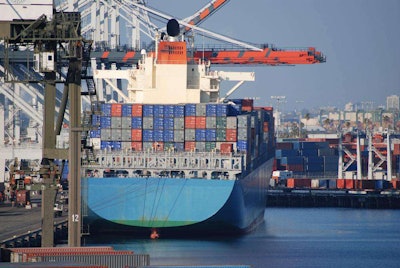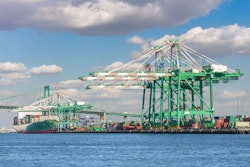 Port of Los Angeles
Port of Los AngelesSeventy to 100 trucking companies are pursing arbitration over late fees incurred in West Coast ports during the recent labor dispute that resulted in gridlock.
Intermodal Association of North America arbitrators have 45 days to render a decision after receiving a case and are expected to begin issuing decisions in May, said Curtis Whalen, executive director of the American Trucking Association’s Intermodal Motor Carrier Conference.The companies seek arbitration under IANM’s Intermodal Interchange and Facilities Access Agreement, the standard industry contract between truckers and water/rail carriers and equipment providers.
West Coast port activity first slowed in November as contract negotiations drug on between dockworkers and port employers. Productivity only began to return after a tentative agreement was reached Feb. 20 on a five-year contract.
IANA assigns one arbitrator representing motor carriers and one from ocean carriers to render a binding decision. A rail arbitrator is added when a tie vote occurs. Most decisions have been reasonable, Whalen said.
The association offers a summary of decisions from August 2008, when arbitration was implemented through September 2013. Forty-five percent of the decisions favored motor carriers, 40 percent favored ocean carriers and the remainder was a split decision between both parties.
Productivity should return to normal in a month, but congestion problems predated the recent gridlock, said Alex Cherin of the California Trucking Association.
The Federal Maritime Commission’s April 13 report on detention and demurrage has been helpful to discussions on the issue, Whalen said. The agency’s staff report on these fees was based on four port congestion forums held last fall and review of tariffs for six vessel-operating common carriers at 32 U.S. terminals.
FMC Chairman Mario Cordero is encouraging trucking companies and shippers nationwide to submit “substantive documentation” to the commission on unreasonable demurrage or detention practices.
“The commission has heard from many importers, exporters and drayage trucking companies complaining about demurrage and detention charges that they must pay even though they cannot timely access their cargo or drop it off before free time expires,” Cordero said.
The FMC just approved an agreement between the Ocean Carrier Equipment Management Association, the West Coast Marine Terminal Operator Agreement and almost every vessel-operating carrier and marine terminal operator in West Coast ports. Effective April 17, it would permit these parties to discuss and reach agreement on ways to reduce West Coast port congestion.
Whalen and Cherin think the agreement is likely to be a positive step to improve cargo flow, given that West Coast port congestion has been a long-term problem.








